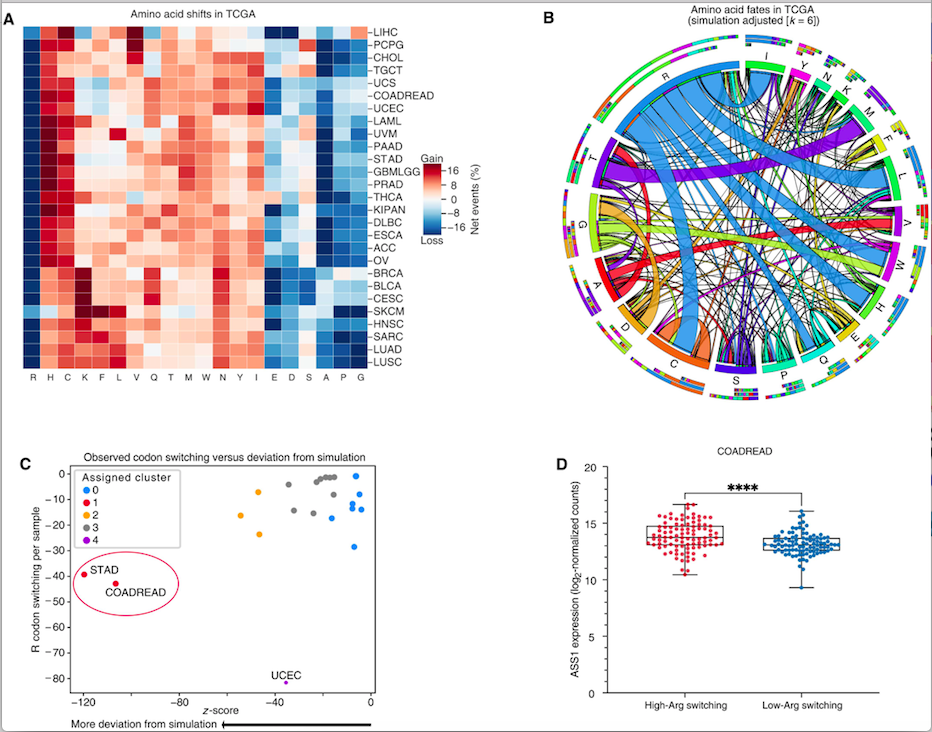Cancer is one of the prominent causes of death globally, and discovering new methods to prevent and cure it is important for public health. Understanding the particular nutrients that cancer cells require is one of the strategies researchers are investigating to fight the disease.
Arginine is one of the important amino acids produced by our bodies naturally, and it is also abundantly found in food sources such as fish, meat, and nuts. According to the research published in Science Advances, cancer cells also need arginine to survive. It is possible to make tumors more susceptible to the body’s natural immune system and improve the effectiveness of treatment by depriving them of this nutrient.
The lack of this amino acid, which the researchers discovered to exist in various types of human cancers, forces the cancer cells to adapt. Cancer cells alter specific proteins to improve their ability to absorb arginine and other amino acids when their levels of that amino acid fall. Amazingly, these cells also induce mutations that lessen their reliance on arginine in an effort to keep growing.
The relationship between arginine and cancer
Arginine, an amino acid, has a big impact on our cells, helping with tasks like getting rid of nitrogen waste and making proteins. It’s unique because it can control how our immune cells respond to cancer and other immunological triggers.
In patients with diseases such as Crohn’s disease, ulcerative colitis, inflammatory bowel disease, or an H. pylori infection, arginine deficiency shows inflammation in tissues. Such patients have a greater risk of developing colon or stomach cancer if treatment is not provided.
The scientists made a remarkable discovery as they delved deeper into the realm of codons—the intricate building blocks of life that hold the code for producing a single amino acid. As they scoured through the Cancer Genome Atlas, they came across thousands of instances of mutated codons. Yet, one particular type caught their attention—the arginine codons.
To their surprise, researchers found that these codons were being lost at an alarmingly high rate during mutations, particularly in the stomach and colorectal cancers. This prompted the researchers to investigate the relationship between arginine and cancer further, leading them to uncover a significant link between the two.
Nutrient deficiency in the cells
The research team devoted several months in the laboratory to nurture cancer cells and then deprived them of arginine. As they subjected the cells to repeated rounds of cellular malnutrition, the cancer cells began to evolve as they sought new ways to secure access to a fresh supply of the critical nutrient. Not all of their attempts were successful. One successful strategy was boosting the number of amino acid transporter proteins, which enabled the cells to absorb arginine and other amino acids more efficiently. However, even these successful adaptations tended to be limited. Over time, the mutations accumulated as the cells replicated, resulting in alterations to the genome, such as altered genes and distorted proteins.
In a different experiment, the scientists discovered an increase in mutations toward codons that encode amino acids that were more prevalent around the cancer cell. It appeared as though the cancer cells were looking for ways to make use of what was available to them.
According to the researchers, this kind of so-called “directed evolution” had not been reported before, linking a specific nutrient to a particular DNA change.
A promising new frontier in cancer research
Interestingly, we may have a shot at defeating the cancer cells by controlling the codons. When they struggle to survive due to the lack of nutrients, they develop numerous mutations and become abnormal to the immune system.
Due to mutations, there is an accumulation of abnormal-looking proteins that the immune system can easily recognize. Cancer cells that were once severely mutated and arginine-starved may no longer be able to avoid the immune system’s attention due to their frayed red flag.
Conclusion
Cancer cells highly desire specific nutrients to support their growth and survival. For the creation of novel and efficient treatments, it is essential to comprehend the nutritional requirements of cancer cells. We may be able to inhibit cancer cell growth and improve patient outcomes by focusing on the nutrients that cancer cells crave. More study is required to fully comprehend the intricate connection between nutrition and cancer cells and use this understanding in the clinical setting.
Article Source: Reference Paper | Reference Article
Learn More:
Top Bioinformatics Books ↗
Learn more to get deeper insights into the field of bioinformatics.
Top Free Online Bioinformatics Courses ↗
Freely available courses to learn each and every aspect of bioinformatics.
Latest Bioinformatics Breakthroughs ↗
Stay updated with the latest discoveries in the field of bioinformatics.
Dr. Tamanna Anwar is a Scientist and Co-founder of the Centre of Bioinformatics Research and Technology (CBIRT). She is a passionate bioinformatics scientist and a visionary entrepreneur. Dr. Tamanna has worked as a Young Scientist at Jawaharlal Nehru University, New Delhi. She has also worked as a Postdoctoral Fellow at the University of Saskatchewan, Canada. She has several scientific research publications in high-impact research journals. Her latest endeavor is the development of a platform that acts as a one-stop solution for all bioinformatics related information as well as developing a bioinformatics news portal to report cutting-edge bioinformatics breakthroughs.






